Online event
Introducing Nduduzo Makhathini
–
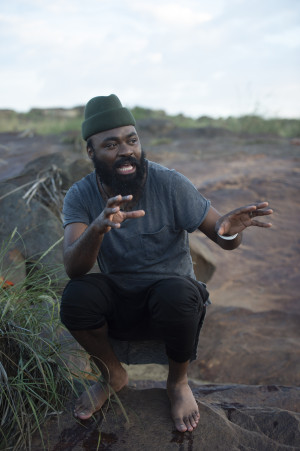
Meet IN·FLO·RES·CENCE Composer: South African Pianist, Scholar, and Healer Nduduzo Makhathini!
For IN·FLO·RES·CENCE Nduduzo Makhathini was commissioned by Reece Ewing to create a composition for solo piano around 1 minute in length responding to the changes to daily life during the global coronavirus outbreak. As part of the platform hosted by The Showroom, this individual piece and 9 others will all be interpreted and performed by the project’s first Artist-in-Residence, Pianist Elio Villafranca, throughout the duration of the project.
Nduduzo Makhathini’s special composition is interpreted by Elio in two takes which birthed out of the following composer notes:
(iHubo) A Song that Travels
‘This piece is based on an ancient Zulu style of singing-storytelling. This mode of musicing existed in precolonial times –– and similar to most heritage artefacts, over the years the style has almost faded out. This is of course due to the three ecological disasters namely; slave trade, settler colonialism and of late apartheid. These catastrophes in black history have hidden, removed, dislocated and displaced lots of memories.’
‘In this sense, this piece seeks to explore the question of ‘what is left, how do we access and carry that forward?’ Of course this is a difficult question, as such this piece begins to think from an echo (a kind of disparity). These are distant memories that have been removed from their source but travel between mountains here in KwaZulu Natal. Thus the process of writing this piece, is in essence an effort towards a sounding out of these echoes towards responding to the question of memory.’ – Nduduzo Makhathini
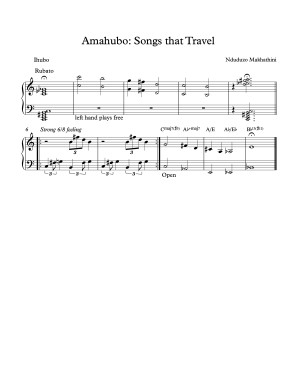
In the below intimate conversation with Kevin Le Gendre (Broadcaster and Writer of Don’t Stop the Carnival: Black British Music, 2019), Nduduzo discusses his experiences living through the pandemic in a place as socioeconomically and historically layered as South Africa; the failing funding schemes for creatives globally; diverse solutions of how to create and communicate whilst modes of connection and gathering are threatened; gaining a newfound appreciation for silence – silence between the notes, and how it’s sound itself; and jazz as a medium of connection.
They continue to discuss Nduduzo’s new album Modes of Communication: Letters from the Underworlds, and what it’s like being physically alone after producing something grounded out of collaboration. He reflects on the importance of prophetic cosmology, contemporary spirituality, and enduring communality, such as the Zulu word ubuntu meaning ‘I am, because you are’ which is all about being connected with others, especially during the current dissonance felt within this cultural context. He also shares more about the creative twist in his journey of – in lieu of an international tour – having an album launch with his wife in their lounge, emphasising intimacy and new ways of telling a layered story.
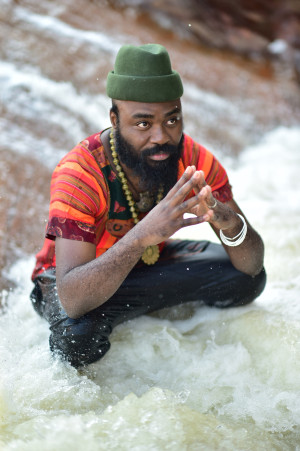
His special commission Amahubo, which translates to Psalms, is about what survives, transcends, and echoes out of trauma – in this case transatlantic journeys. In reference to what philosopher Fred Moten calls ‘ecological disasters’, Nduduzo is asking what is left after this? How can indigenous tonality never be colonised? It’s about following a singer and phrase, not being restricted by bars or times. In lieu of prevalent oral history traditions in contemporary society, a ritual of echoes can effectively summon memories – echoes that now lie between consciousnesses, mountains, and listening.
Nduduzo Makhathini often references water or the river, such as in his song Indawu from his new album Modes of Communication: Letters from the Underworlds, and also his composition for IN·FLO·RES·CENCE iHubo, which is an onomatopoeia to express the sound of a flowing river. Nduduzo reflects that at a cosmological level, the Zulu people always paid attention to the cosmos and most particularly sound as a form of knowing.
‘Indawu pays tribute to the spirits of the Nguni people that live in and underneath water,’ explains Makhathini. ‘These spirits are known for their fondness towards music and dance, hence the riverbank becomes a central ritual space visited to appease the ancestors.’
On 3 April 2020 Nduduzo Makhathini released his Blue Note Records debut Modes of Communication: Letters from the Underworlds, an expansive album anchored by Makhathini’s expressive piano in which lyrical, plaintive horns mingle with percussion, pained yelps and urgent lyrics. The album features the American alto saxophonist Logan Richardson with a South African band including tenor saxophonist Linda Sikhakhane, trumpeter Ndabo Zulu, bassist Zwelakhe-Duma Bell Le Pere, drummer Ayanda Sikade, percussionist Gontse Makhene, and vocals by Msaki as well as Nduduzo’s wife Omagugu Makhathini, and background vocals by their children Nailah, Thingo, and Moyo.
Makhathini was scheduled for a huge US and EU tour to promote his new album, but due to COVID-19 was unable to travel. Ironically, he’s now trending on social media performing from home as part of online international festivals such as Worldwide Music for Our Cultures, Act for Music and NPR Music.
Nduduzo Makhathini is an award-winning pianist, improvisor and scholar from South Africa. He’s a recipient of the Standard Bank Young Artist Award, South African Music Award (SAMA) and AFRIMA, and has nine albums including his most recent Modes of Communication: Letters from the Underworlds on Blue Note Records. Growing up in the small town uMgungundlovu near Pietermaritzburg, KwaZulu Natal. Makhathini was surrounded by music as a child. Coming from a very musical family- his mother was a pianist and his father a guitarist- he was exposed to a range of music including traditional Zulu music. He recalls turning the knob on the radio until it reached the end, where he would listen to Indian music. He was part of the choir at school and would sing at church, and until he was finished school, his voice was his instrument. It was only after High School that he started to study jazz piano.**
Nduduzo feels his career has developed in what he describes as an organic process, starting with his upbringing and the influence of his mother being his first piano teacher. ‘Over the years I have learnt that if you submit yourself to the music or whatever your dream is then mother-nature has a way of taking care of the rest’. Makhathini now heads University of Fort Hare’s music department while completing his PhD at Stellenbosch University. His performs as both headline and sideman at international festivals and club concerts. Makhathini recently collaborated with Jazz at Lincoln Center Orchestra and Wynton Marsalis touring the US, South Africa and Vienna. He also has collaborated with alternative artists like DJs Black Coffee and Dacapo, and produced albums for singer-songwriters Msaki and Thandiswa Mazwai.
After school, in 2001, he went to study music at the Durban Institute of Technology. Here he learnt under the guidance of Neil Gonzalvez, Demi Fernandez and Susan Berry. In 2006 Makhathini performed with a band called Voice featuring Marcus Wyatt, Herbie Tsoaeli, Morabo Molajele and Sydney Mnisi. Following that he toured Europe with internationally acclaimedSimphiwe Dana and shared stages with Herbie Hancock and Miriam Makeba- to name a few- at the Avo Session Jazz Festival in Basel. In 2008 Makhathini joined legendary jazz saxophonist Zim Ngqawana’s Zimology Quartet and toured with them throughout Europe and the United States. Following that, in 2009 he joined Carlo Mombeli’s band and continued to tour with the Zimology Quartet. Has also worked with Andile Yanana, Herbie Tsoaeli, Busi Mhlongo, Madal Kunene, Kesivan Naidoo, Sidney Mavundla, Ayanda Sikade, Omagugu, Jimmy Dludlu, Thandiswa Mazwai, Feya Feku, Salim Washington, Carlo Mombelli, Jonathan Crossley, Adam Glasser, McCoy Mrubata, Mthunzi Mvubu and Malcolm Jiyane and produce albums for Xolani Sithole, Mbuso Khoza, Lindiwe Maxolo, Tumi Mogorosi, Sisa Sophazi.
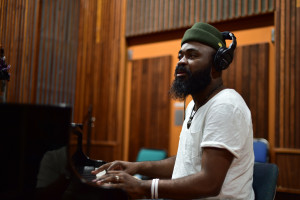
Related
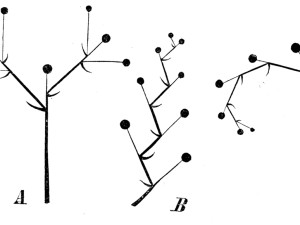
Online
Fortnightly Highlight 9: IN·FLO·RES·CENCE
–
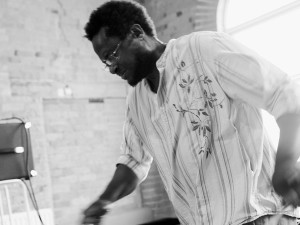
Event
Introducing Composer Corey Mwamba
–
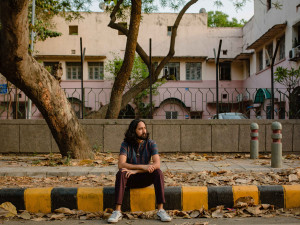
Online
Introducing Composer Sarathy Korwar
–
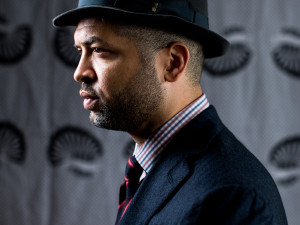
Online
In conversation: Jason Moran, Elio Villafranca & Project Co-Curators
– ,
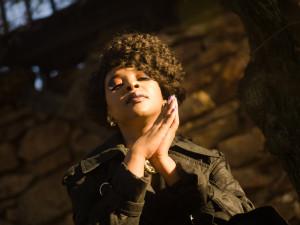
Online
Introducing Composer Siya Makuzeni
–
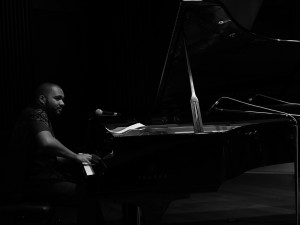
Online
Introducing Composer Bokani Dyer
–

Online event
In conversation: Dr. Tammy Kernodle with Elaine Mitchener, Siya Makuzeni & Thandi Ntuli
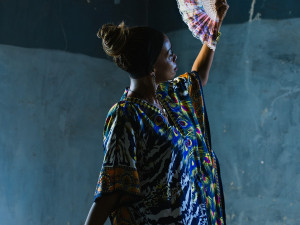
Online event
Introducing Composer Leyanis Valdés Reyes
–
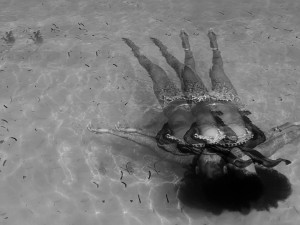
Online event
In conversation: Phoebe Boswell, Laura Lima, Nduduzo Makhathini & Elvira Dyangani Ose
–
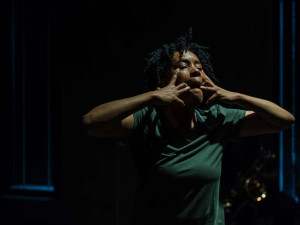
Online event
In conversation: Elaine Mitchener, Kodwo Eshun, Temi Odumosu & Elvira Dyangani Ose
–
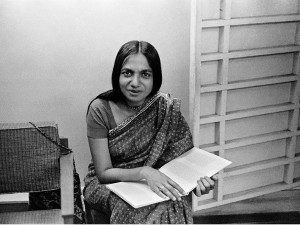
Online event
In conversation: Vijay Iyer, Andrea Giunta, Brinda Kumar & Kevin LeGendre
–
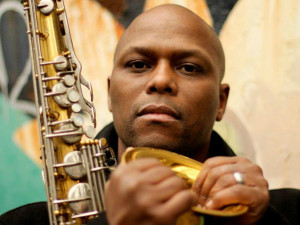
Online event
Introducing J.D. Allen
– ,
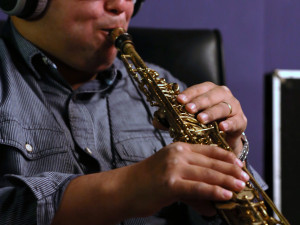
Online
Introducing Luis Carlos Pérez
–
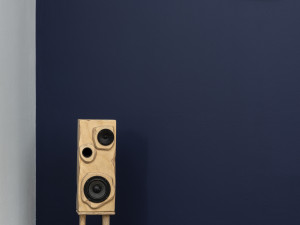
Online
In conversation: Andrew Pierre Hart, Charmaine Watkiss, Nduduzo Makhathini & Katherine Finerty
–
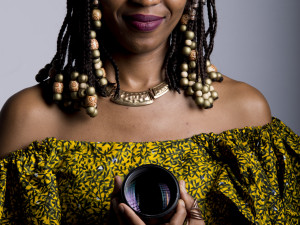
Online
Introducing Composer Thandi Ntuli
–
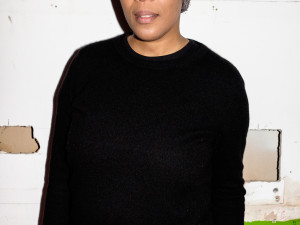
Online
Introducing Composer Elaine Mitchener
–
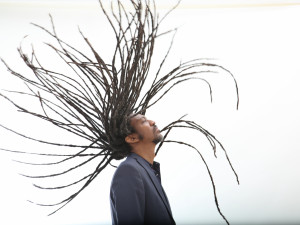
Online
Introducing Artist-in-Residence Elio Villafranca
– ,
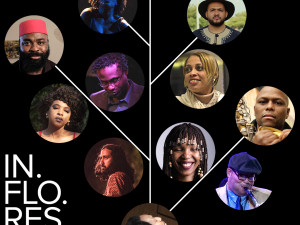
Exhibition
IN·FLO·RES·CENCE
–